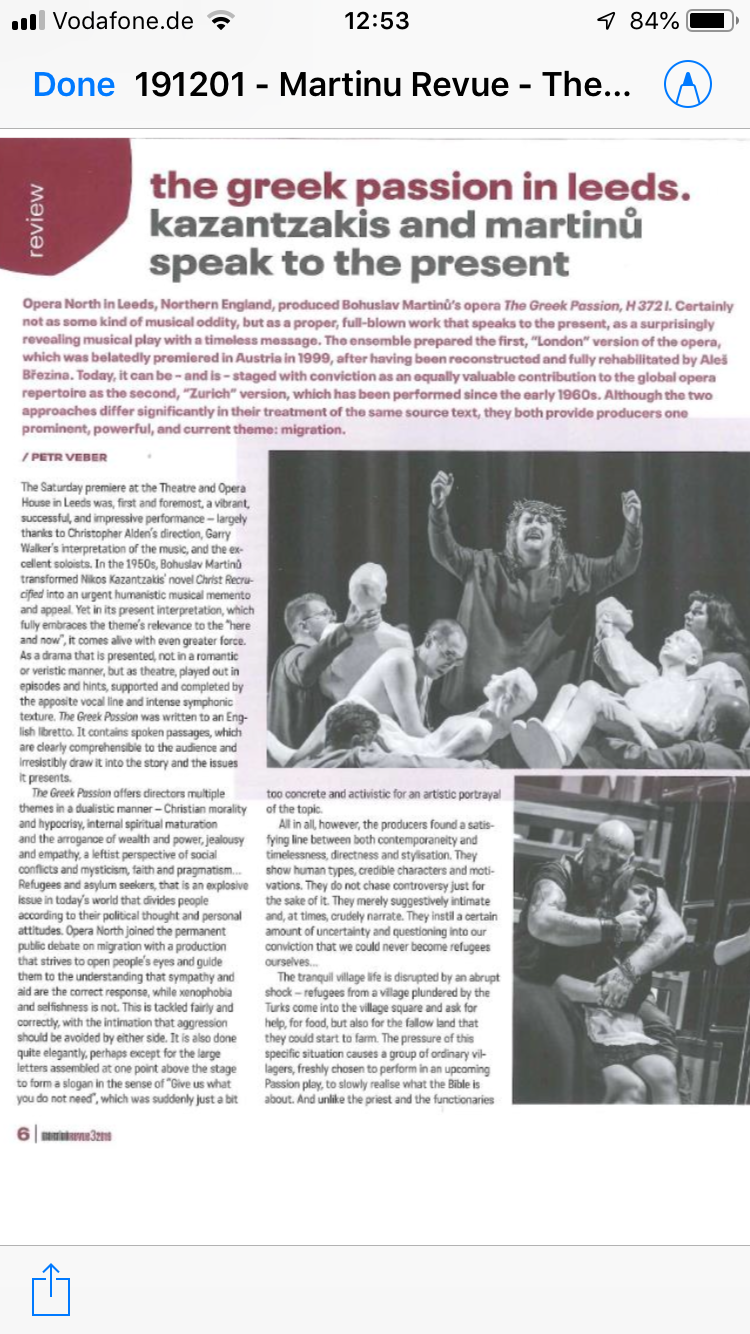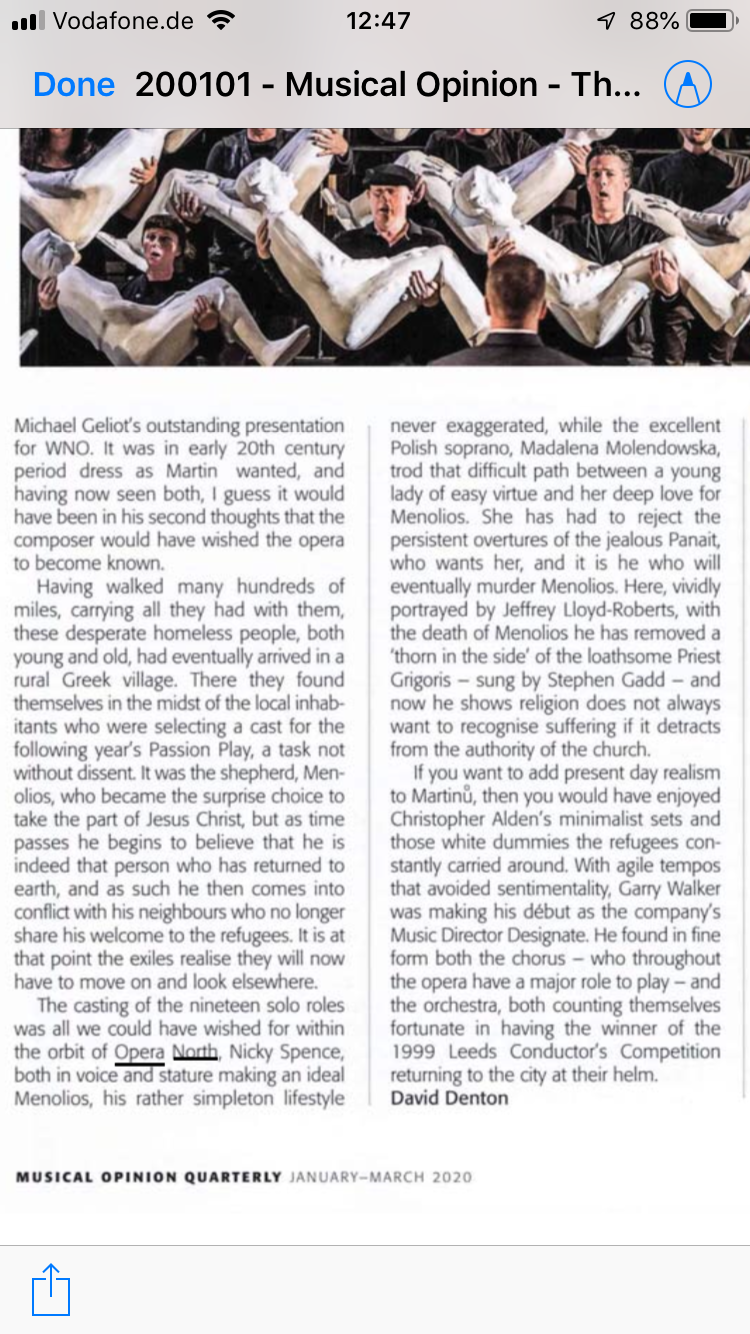Femi Elufowoju jr’s imaginative reinvention of Verdi's Rigoletto features some strong, compelling performances
Verdi: Rigoletto - Sir Willard White, Callum Thorpe, Eric Greene, Roman Arndt, Themba Mvula - Opera North (Photo Clive Barda)
Verdi Rigoletto; Eric Greene, Jasmine Habersham, Roman Arndt, dir: Femi Elofowoju jr, cond: Garry Walker; Opera North at the Grand Theatre Leeds
Reviewed by Robert Hugill on 4 Feburary 2022 Star rating: 4.5 (★★★★½)
Compelling performance bring Femi Elofowoju jr's remarkable contemporary re-invention of Rigolettoto life
Ostensibly, Victor Hugo’s play Le Roi s’amuse satirised the licentious court of King Francis I of France, but at the play’s 1832 premiere in Paris the authorities thought the subject close enough to home to ban it after one performance. Verdi’s opera Rigoletto uses the play as its source material, and he and librettist Francesco Maria Piave had similar problems when Rigoletto was premiered in Milan in 1851. Rigoletto should disturb and should hold a mirror up to society. But how to do so whilst dealing with the work’s misogyny and treatment of disability.
Femi Elufowoju jr’s new production of Verdi’s Rigoletto at Opera North (seen 4 February 2022 at the Grand Theatre, Leeds) takes a dramatic and remarkably compelling approach. Roman Arndt was the Duke with EricGreene as Rigoletto and Jasmine Habersham as Gilda, plus Sir Willard White as Monterone and Callum Thorpe as Sparafucile. Garry Walkerconducted, and designs were by Rae Smith.
Verdi: Rigoletto - Callum Thorpe, Alyona Abramova, Roman Arndt, Jasmine Habersham, Eric Greene - Opera North (Photo Clive Barda)
Elufowoju had moved the action to the present day with Arndt’s Duke as more of a high-end gangland boss, though the setting was unspecific. Smith’s stunning designs, with visuals channelling artists such as Kehinde Wiley and Yinka Shonobare, created their own strong atmosphere. Both scenes in Act One and that in Act Three were each like a picture, and each had a vivid use of colour.
But the production used colour in a different way as well. The casting was the opposite of colour blind and Elufowoju’s production placed race at its very centre. Having Rigoletto, Gilda, Monterone, Marullo and Countess Ceprano as people of colour in the largely white court of the Duke created a new setting that minded Elufowoju’s own background; he is British-Nigerian. Remarkably, this was his first opera production.
The problem with Rigoletto is that for the mechanics of the plot to work, Monterone’s curse on Rigoletto as to have dramatic immediacy (something Jonathan Miller did brilliantly in his English National Opera production). In the context of Elufowoju’s British-Nigerian background the curse does indeed work, and the production is very much about Rigoletto’s role as a black man in a modern and white society. Yet is all remains true to the original libretto.
Verdi: Rigoletto - Eric Greene, Jasmine Habersham
Opera North (Photo Clive Barda)
Elufowoju describes the setting thus, “We could be anywhere men mix power and wealth, and indulge in toxic misogyny in wanton abundance and abandonment. Abuse, corruption and criminal activity are rife, the world of the rich and mindless remains impenetrable”. Thus for Elufowoju, Rigoletto’s “’deformity’ is a manifestation of the paranoia of the outsider”.
In the title role, Eric Greene gave a remarkable performance, intense and very physical, alert to every nuance of the music, and he used his height to emphasise this. His wasn’t a likeable Rigoletto, and some moments in the first scene were positively nasty, and only in moments with his daughter did her unwind somewhat. There was a vividness to Greene’s performance which made you understand Rigoletto’s predicament. If Greene’s voice did not always respond to the pressure he put on it and lacked the idea amplitude for this role, this was more than compensated for by his musical intelligence and the compelling nature of his performance.
Jasmine Habersham made a charming Gilda, conveying her Miranda-like naivety and sense of wonder without ever making you think that she was dim, which is always a danger in this character. She has quite a light voice, perhaps lacking ideal amplitude, but true and she made her famous solo an interesting personal thought rather than simply a dazzling showpiece. She and Greene had a strong, believable relationship and their scene in Act One was a highlight. Gilda’s relationship with the Duke, or perhaps her idea of the Duke, was believable and in the second and third acts Habersham conveyed Gilda’s remarkable inner strength.
Roman Arndt’s Duke was a careless, charismatic character with great physical charm and an utter contempt for conventional morality, taking whatever he wanted. This was emphasised in he first scene as Elufowoju gave him a very present wife, a silent but present witness to his casual pursuit of other women. Arndt brought a nervous energy and great physicality to the role, and if his singing perhaps lacked an ideal Italianate sheen, it was vivid and musical. His fatal charm was demonstrable and believable.
Around these there were a series of strong performances, including five from members of the chorus. Sir Willard White was thrilling as Monterone, making the character’s two short scenes seem far more. His voice has lost none of its power and his attention to the text was exemplary. Callum Thorpe’s Sparafucile was present for the opening scene, and Thorpe combined wonderful blackness of voice with threatening sense of stillness that compelled both ear and eye. As his sister, Alyona Abramova made Maddalena much more than a vamp, bringing out her youth. Ross McInroy was a charming, selfish Ceprano with Molly Barker as his delightful wife. Thmeba Mvulla was Marullo, the only other black man at court, and he was fatally plausible. Hazel Croft made Giovanna a real character, not a cipher and Helen Evora was poised as the (female) PA-like page. Campbell Russell was Borsa, Gordon D Shaw was bodyguard and usher.
Verdi: Rigoletto - Eric Greene, Roman Arndt - Opera North (Photo Clive Barda)
As I have said, the settings were stunning, though the abstract visuals for Rigoletto’s house (including a full-sized zebra) threated to over-dominate the action. But the final inn scene, set in a liminal backstreet are complete with abandoned car, was something of a visual coup. The ending, with a dramatically vivid quartet and Rigoletto’s moving duet with his dying daughter, managed to be fresh and moving rather than hackneyed.
Whilst there were no idea Verdi voices in the cast, the sheer vividness and detail of the performances carried the day. The Opera North chorus was in great form, gibing a series of individual character sketches and sounding on form. In the pit, Garry Walker gave us lithe, fluent Verdi with a rhythmic alertness that reflect the work’s origins.
This was a performance that I could happily have seen again and again. There was so much detail in Elufowoju’s vision of the piece and the compelling way the performers responded to his ideas was profoundly rewarding.
Verdi: Rigoletto
Opera North at the Grand Theatre, Leeds







